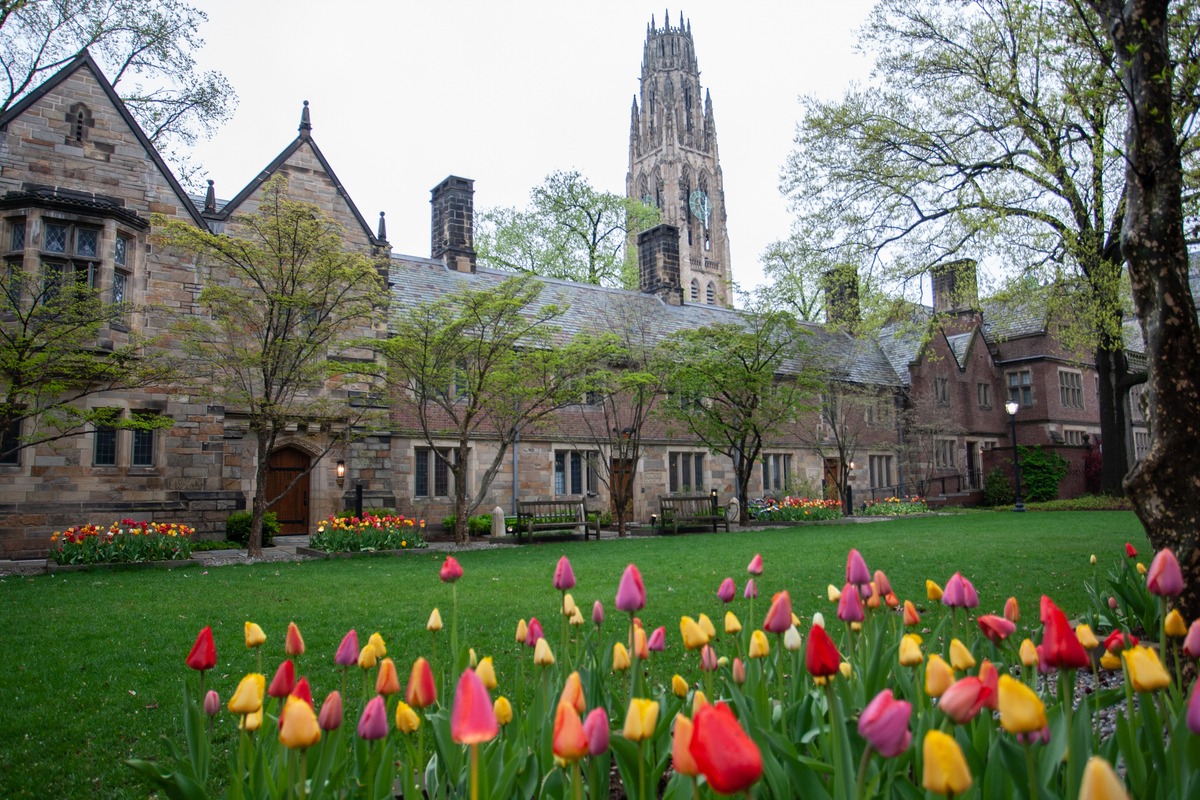Poet Charles North reads at Jonathan Edwards College Tea
Head of College Paul North hosted his uncle, poet Charles North for Jonathan Edwards’ first in-person college tea since the outbreak of the COVID-19 pandemic.

Jack Devlin, Staff Photographer
Acclaimed poet Charles North visited Jonathan Edwards to speak at the college’s first in-person tea in three years.
The event, hosted on Sept. 4, ran in collaboration with professor Karin Roffman’s debut course “Poets and Their Papers” — a poetic research class which centers around living poets, including Charles North, whose papers are held in the Beinecke Rare Book and Manuscript Library. This is JE’s first college tea under Paul North, its new head of college and Charles North’s nephew.
“In the University we tend to be at arm’s length from the writers and their process of writing, so this reading was an excellent and rare opportunity to get in there and see how things are done from the poet’s side,” Paul North told the News. “We had 55 people in attendance, which is a wonderful turnout for a college tea. This indicates to me what a genuine love of poetry we have amongst the student body. I was surprised and amazed by the extent of the enthusiasm in the room.”
The event began with a reading, as Charles North shared selections from his anthology, “New and Selected Poems” and his newest collection, “Everything and Other Poems.”
He read a range of poems and shared anecdotes with the audience about his relationships with fellow poets within the second generation of the “New York School” — a nebulously defined group of poets living in New York City in the 1960s whose work was thematically experimental, philosophical and anti-establishment.
Charles North then transitioned to a discussion of the effect his early mentor and teacher Kenneth Koch had on the beginning of his poetic career. He shared that he did not take a liking to the art form until his mid-20s, having found it boring throughout his early education. He explained that he was dissatisfied with the way he was traditionally taught poetry; the traditional English curriculum he was exposed to as a child gave him a very distant and formal view of the art form.
“Kenneth turned out to be the best poetry teacher in the history of our country,” Charles North continued. “He changed my life during a time when I felt like I was floundering. I was amazed by the way Kenneth Koch taught — it pulled the rug out from under traditionally formal ways of teaching poetry.”
In addition to speaking at the tea, Charles North visited Roffman’s class. Roffman’s course, “Poets and their Papers,” has been studying the work and personal life of Charles North since the beginning of the semester, reading through his personal composition notebooks, poetic drafts and correspondences to fellow New York School poets like Ron Padgett and Paul Violi. The new course immerses students in the poetic drafting process, tracking how a poem develops from its initial conception to its published form.
Roffman noted that while reading the poems as they are published is important, it is crucial to hear the poem as it sounds in the voice and tempo of the poet. These subtle changes reveal multitudes about the poet’s vision and meaning of their work, and allows us to shift our understanding of the poem to reflect what the poet initially intended.
“It is a remarkable experience to hear a poet, in a way, annotate their papers,” Roffman said. “Pulling out old notebooks and drafts of things from well-packed boxes in a library reading room, it is easy to forget that these things were once blank pages on someone’s desk, surrounded by other papers, books and pieces of their life.”
In his visit to Roffman’s class, Charles North recovered some lines of a poem he had written in about 1988 in one of his many handwritten compositional notebooks. These fragments of a poetic draft, discarded at the time, were now wonderful to him as he suddenly encountered them decades later, Roffman said.
“When the poet encounters their own drafts or notes or letters, often after not seeing them for years, many different things occur, but sometimes one of them is that they recall what was happening around the page — both activities and thoughts — and we hear more about things that were going on at the same time,” Roffman said.
Keeley Brooks ’25, an audience member and a student in Roffman’s course, added that Charles North’s visit supplemented her research and illuminated the course material.
“Hearing North read out loud the poems we have been studying in class was magical,” Brooks said. “It was a lovely experience to hear them spoken with North’s stylistic vocal inflections and syllabic emphasis.”
Brooks noted the “joy” that Charles North expressed in his collaborations and discussions with other poets.
Reflecting on what it felt like to host his first college tea, Paul North noted that what he most enjoys about his job is engaging the people around him in intellectual and artistic thinking that can spur new conversations.
“I’ve seen Charles North read many times alongside big name poets from the New York School,” Paul North said. “But what really struck me about this experience was how funny his poetry is — it was so nice seeing how closely the audience engaged with the humor which spread to a joyful, enthralling atmosphere amongst the crowd.”
The Beinecke Rare Book and Manuscript library holds 11 boxes of Charles North’s personal papers available for view to all students and faculty of the University.







